自考英语学习资料:综合英语(一) 动词句型
- 格式:doc
- 大小:66.00 KB
- 文档页数:14
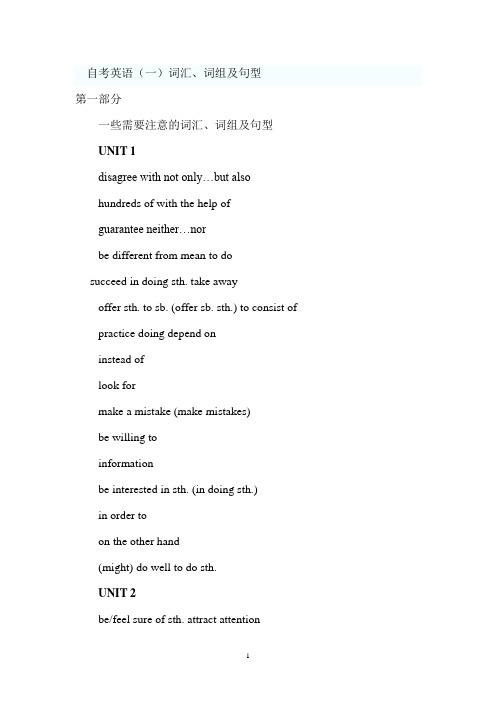

Lesson Six How Dictionaries Are Made打印本页一、词汇have confidence(→<a.>confident) in 对…有信心be confident inchief editor 主编existdozen 一打fortnight= 2 week 两星期have () influence on 对某人有…的影响tape recorder 录音机all kinds/sorts of=various 各种各样的inventor 发明家,发明者二、课文分析1.课前预习:请在开始本教程之前跟着本书配套磁带朗读单词和课文2遍,大致熟悉课文内容。
2.重点句型及常用短语:(1)教材上册P122~123的常用短语必须都牢记(2) It is believed that 人们普遍认为It is said that 据说It is reported that 据报道(3) offer to doa fewHe made a few spelling mistakes in the last dictation.在上次听写中,他犯了好几个拼写错误。
Few people understand this theory.没有什么人懂得这一理论。
(5) bring up VS grow upbe willing to do sth.be out of one's mindaccording toAccording to the weather forecast, it will be fine tomorrow.look uparrive at/inapply toThe rules of safe driving apply to everyone.安全驾驶的规则适用于所有人。
Lesson SixHow Dictionaries Are Made本句翻译:字典是怎么被编写成的1 It is widely believed that every word has a correct meaning, that we learn thesemeanings mainly from teachers and grammars, and that dictionaries and grammar books are the highest authority in matters of meaning and usage.本句翻译:人们普遍认为每一个词都有一个正确的涵义,而且我们主要是通过老师和语法书来学到这些词的涵义,像字典以及语法书实际上是我们在学一个词的用法以及其涵义的最高的权威。

自考英语专业综合英语笔记上册(第一课)自考英语专业综合英语笔记上册(第一课)The time message1.Time is tricky,It is difficult to control and easy to waste.When you look ahead,you think you have more time than you need.*sth.is+difficult/easy to do:表示某事难可容易....例:The book is diffiult to understand.这本书很难看懂。
*look ahead:一表示向前看,二表示展望未来。
2.For example, at the beginning of a semester,you may feel that you have plenty of time on your hands. But toward the end of the term you may suddenly find that time is running out.You don't have enough time to cover all your duties,so you get worried.What is the answer?Control!*plenty of:大量*have time on one's hands:有许多时间*towards the end of...:即将结束时*run out of:用完3.Time is dangerouse.If yo u don’t control it,it will control you. If you don’t make it work for you,it will work against you.*If you don’t make it work for you...此处动词make的句型是make+宾语+不带to的不定式,表示“使...做某事”。

自考英语(一)英语语法基础:情态动词情态动词的定义:情态动词是一种本身有必然的词义,表示说话人的情绪,态度或语气的动词,但不能单独作谓语, 只能和其他动词原形构成谓语。
We can be there on time tomorrow.我们明天能按时去那儿。
May I have your name?我能知道你的名字吗?Shall we begin now?我们现在就开始吗?You must obey the school rules.你必需遵守校规。
情态动词数量不多,但用途广泛,主要有下列:can (could), may (might), must, need, ought to, dare (dared), shall (should), will (would) .情态动词的位置:情态动词在句中放在谓语动词之前, 谓语动词前若有助动词,则在助动词之前,疑问句中, 情态动词则在主语之前。
I can see you. Come here.我能看见你,过来吧。
He must have been away.他必然走了。
What can I do for you?你要什么?How dare you treat us like that!你怎能那样对待我们!情态动词的特点:情态动词无人称和数的变化, 情态动词后面跟的动词需用原形,否定式构成是在情态动词后面加“not”。
个别情态动词有现在式和过去式两种形式, 过去式用来表达更加客气, 委婉的语气, 时态性不强, 可用于过去,现在或将来。
He could be here soon.他很快就来。
We can’t carry the heavy box.我们搬不动那箱子。
I’m sorry I can’t help you.对不起,我帮不上你。
情态动词的用法:can (could) 表示说话人能,可以,同意,准许,以及客不雅条件许可,could 为can 的过去式。

第一部分一些需要注意的词汇、词组及句型UNIT 1disagree with不同意not only…but also 不仅...而且hundreds of数百with the help of与帮助guarantee保证neither…nor既不...也不be different from有所不同mean to do打算做succeed in doing sth 成功地做某事. take away 带走consist of 包括offer sth. to sb. (offer sb. sth.) to提供某物。
某人/(提供某人。
事物。
)要practice doing实践做depend on依靠instead of而不是look for寻找make a mistake (make mistakes) 犯了一个错误(犯错误)be willing to愿意information信息be interested in sth. (in doing sth.) 感兴趣的事物。
(在做某事。
)in order to为了on the other hand另一方面(might) do well to do sth. (可能)做好做某事。
UNIT 2be/feel sure of sth. 是/某物感觉肯定。
attract attention吸引注意力lead…with…for the most part大部分due persuade sb. to do sth. 由于说服某人。
做某事。
similar to sth类似的事物furniture clothing家具服装be charged to available现有收费in addition to 除了put out扑灭raise/rise提高/升be characteristic of是特征spend on sth./in doing sth. 对某事物花/在做某事。
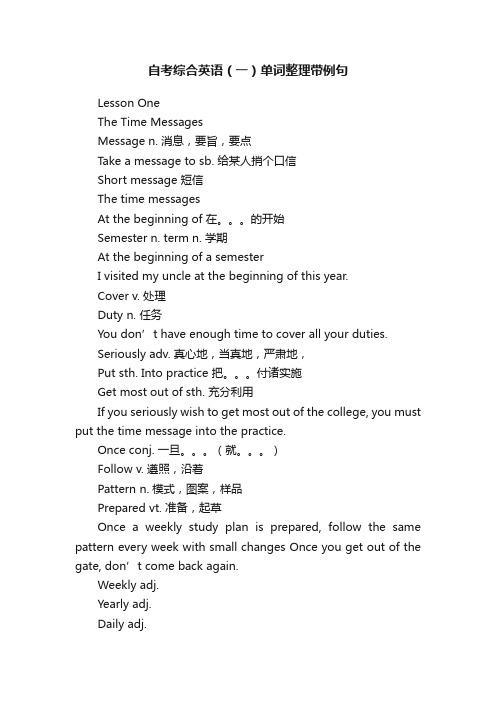
自考综合英语(一)单词整理带例句Lesson OneThe Time MessagesMessage n. 消息,要旨,要点Take a message to sb. 给某人捎个口信Short message 短信The time messagesAt the beginning of 在。
的开始Semester n. term n. 学期At the beginning of a semesterI visited my uncle at the beginning of this year.Cover v. 处理Duty n. 任务You don’t have enough time to cover all your duties.Seriously adv. 真心地,当真地,严肃地,Put sth. Into practice 把。
付诸实施Get most out of sth. 充分利用If you seriously wish to get most out of the college, you must put the time message into the practice.Once conj. 一旦。
(就。
)Follow v. 遵照,沿着Pattern n. 模式,图案,样品Prepared vt. 准备,起草Once a weekly study plan is prepared, follow the same pattern every week with small changes Once you get out of the gate, don’t come back again.Weekly adj.Yearly adj.Daily adj.The nurse attended the patient daily.Realistic adj. 现实可行的Be realistic, allow for unexpected things.Essay n. 作文,短文Quiz n. 考查,测验Often you know from experience how long it takes you to write a short essay, to study for a quizUpset v. 打乱,打翻adj. 伤心,(同义词sad)Otherwise adv. 否则Otherwise your entire plan may be upsetAbility n. 能力,才智Grade n. 分数Achieve v. 获得How much study time you plan for each classroom hour depends on four things:(1) your ability,(2) the difficulty of the class, (3) the grades you hope to achieve, and (4) how well you use your study time.Flexible adj. 灵活的Keep your plan flexibleOn the basis of 在。
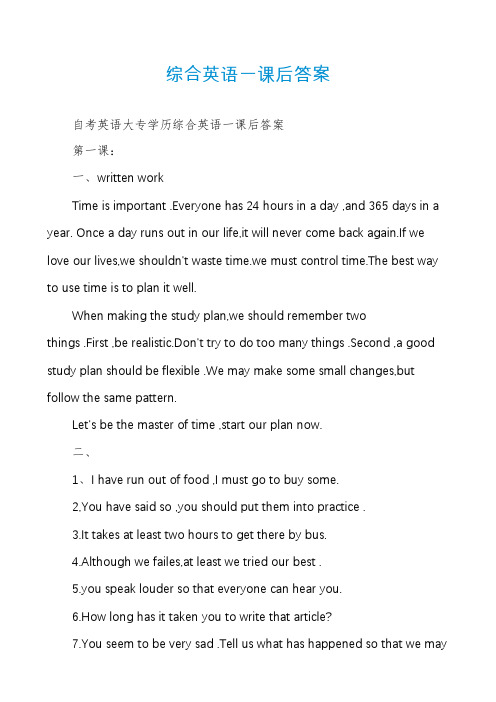
综合英语一课后答案自考英语大专学历综合英语一课后答案第一课:一、written workTime is important .Everyone has 24 hours in a day ,and 365 days in a year. Once a day runs out in our life,it will never come back again.If we love our lives,we shouldn't waste time.we must control time.The best way to use time is to plan it well.When making the study plan,we should remember twothings .First ,be realistic.Don't try to do too many things .Second ,a good study plan should be flexible .We may make some small changes,but follow the same pattern.Let's be the master of time ,start our plan now.二、1、I have run out of food ,I must go to buy some.2,You have said so ,you should put them into practice .3.It takes at least two hours to get there by bus.4.Although we failes,at least we tried our best .5.you speak louder so that everyone can hear you.6.How long has it taken you to write that article?7.You seem to be very sad .Tell us what has happened so that we mayhelp you.8.We should keep our classroom clean.9.We may asd Xiao Wang to help us ,he seems to have a lot of time.10.My brother will come to Beijing next week. he must make good use of time to stay here.三、用本课的动词句型1。
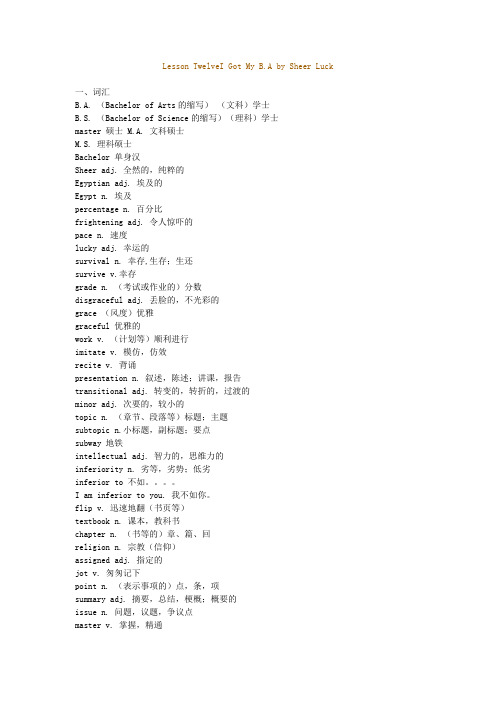
Lesson TwelveI Got My B.A by Sheer Luck一、词汇B.A. (Bachelor of Arts的缩写)(文科)学士B.S. (Bachelor of Science的缩写)(理科)学士master 硕士 M.A. 文科硕士M.S. 理科硕士Bachelor 单身汉Sheer adj. 全然的,纯粹的Egyptian adj. 埃及的Egypt n. 埃及percentage n. 百分比frightening adj. 令人惊吓的pace n. 速度lucky adj. 幸运的survival n. 幸存,生存;生还survive v.幸存grade n. (考试或作业的)分数disgraceful adj. 丢脸的,不光彩的grace (风度)优雅graceful 优雅的work v. (计划等)顺利进行imitate v. 模仿,仿效recite v. 背诵presentation n. 叙述,陈述;讲课,报告transitional adj. 转变的,转折的,过渡的minor adj. 次要的,较小的topic n. (章节、段落等)标题;主题subtopic n.小标题,副标题;要点subway 地铁intellectual adj. 智力的,思维力的inferiority n. 劣等,劣势;低劣inferior to 不如。
I am inferior to you. 我不如你。
flip v. 迅速地翻(书页等)textbook n. 课本,教科书chapter n. (书等的)章、篇、回religion n. 宗教(信仰)assigned adj. 指定的jot v. 匆匆记下point n. (表示事项的)点,条,项summary adj. 摘要,总结,梗概;概要的issue n. 问题,议题,争议点master v. 掌握,精通compose v. 写;作(诗等);作曲composer 作曲家correct v. 改正,纠正,修正accurately adv. 准确地take (notes) v. 记(笔记)campus n. (大学或学院的)校园on campus 在校园里underestimate v. 低估hysterical adj. 歇斯底里的,情绪异常激动的expected adj. 预期的,预料的plus adj. (学科评分)高于。
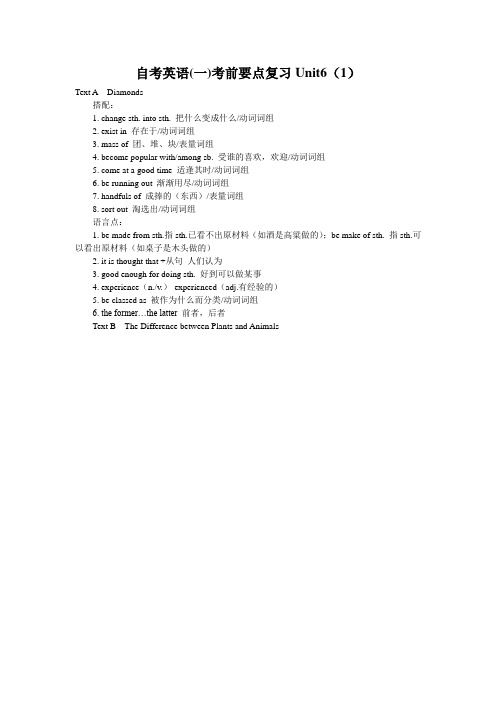
自考英语(一)考前要点复习Unit6(1)
Text A Diamonds
搭配:
1. change sth. into sth. 把什么变成什么/动词词组
2. exist in 存在于/动词词组
3. mass of 团、堆、块/表量词组
4. become popular with/among sb. 受谁的喜欢,欢迎/动词词组
5. come at a good time 适逢其时/动词词组
6. be running out 渐渐用尽/动词词组
7. handfuls of 成捧的(东西)/表量词组
8. sort out 淘选出/动词词组
语言点:
1. be made from sth.指sth.已看不出原材料(如酒是高粱做的);be make of sth. 指sth.可以看出原材料(如桌子是木头做的)
2. it is thought that +从句人们认为
3. good enough for doing sth. 好到可以做某事
4. experience(n./v.)-experienced(adj.有经验的)
5. be classed as 被作为什么而分类/动词词组
6. the former…the latter 前者,后者
Text B The Difference between Plants and Animals。
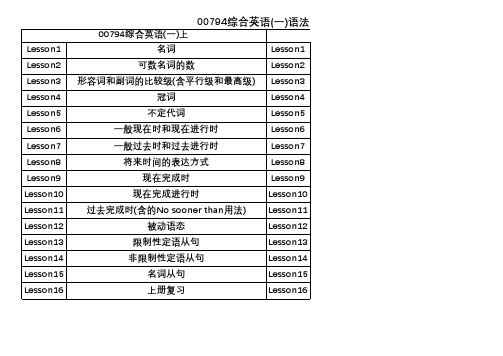

Unit25(第74讲—第76讲) 本课主要语⾔点 1. American men don't cry because it is considered not characteristic of men to do so. 动词consider的⽤法如下: ① Consider +宾语+宾补 They considered the attack a mistake. (他们认为这次进攻是错误。
) ② Consider +宾语+动词不定式 They considered themselves to be very lucking.(他们认为⾃⼰很幸运。
) ③ Consider +宾语+ as They don't consider it as important.(他们认为那个不重要。
) ④ Consider +宾语+形容词 They consider it wise not to criticize him.(他们认为不批评他是明智的。
) ⑤ Consider +宾语 He had no time to consider the matter.(他没有时间考虑这个事情。
) ⑥ Consider +V-ing He is considering changing his job.(他在考虑换⼀份⼯作。
) “be considered not characteristic of ……,” consider 在此处的⽤法当归于④。
be characteristic of 意思是 be typical of.如: 1)Carelessness and impatience are characteristic of him.(粗⼼、⽆耐⼼是他的特点。
) 2)Long winter and short spring are characteristic of the climate here.(冬天漫长,春天短暂是这⼉的⽓候特点。

自考英语(一)复习资料第六章(5)二、表示进行动作的动词时态:现在进行时、过去进行时、将来进行时1.现在进行时:表示正在进行的动作或者现阶段正在持续的动作。
其形式为am/is/are doing.常与进行时连用的时间状语有:now, at this moment, at present等。
如:What are you reading now? 你在看什么?I am reading today’s Evening News. 我在看今天的晚报。
(表示正在进行)These days I am translating a book. 这几天我在翻译一本书。
(表示持续性的动作)注:a)现在进行时表示计划安排好要做的事情。
这一用法只适用于某些动词,如:go, come, leave, start, arrive, return 等。
如:Are you going abroad next year? 明年你要出国吗?I am leaving by train tonight.我今晚坐火车走。
b)现在进行时与always, forever, constantly等连用,往往表示抱怨、厌烦、不合理或使人不愉快的事情。
如:Jack is always borrowing money and forgetting to pay you back.杰克常常借钱忘还。
My father is forever criticizing me.我父亲总是批评我。
c) 在不少情况下,表示正在进行的动作的汉语句子中没有“正在”的字样,但在译为英语的时候必需用进行时态。
如:How is everything going.事情进展的怎么样了?How are you getting on with your classmates.你和同学相处的如何?d) 不能用进行时的动词有:表示感觉或感情的词:hear, see, smell, taste, feel表示存在或所属的词:exist, stay, remain, have表示认识或理解的词:understand, remember, forget, believe2.过去进行时:过去进行时表示过去某时正在发生的动作或者过去某段时间持续的动作。

综合英语(一)自考题-1(总分:100.00,做题时间:90分钟)一、{{B}}第一部分选择题{{/B}}(总题数:0,分数:0.00)二、{{B}}Ⅰ.用适当语法形式或词汇填空{{/B}}(总题数:20,分数:20.00)1.I was told that his first job was in a factory, ______ worked the night shift.∙ A. he just∙ B. and who∙ C. where he∙ D. there he(分数:1.00)A.B.C. √D.解析:[解析] 译文:他的第一份工作是在工厂,他要值夜班。
night shift的意思是夜班。
本句为表地点的定语从句,所以用关系副词where引导表示哪里。
答案为C。
2.This young man could fix almost everything. He was ______ of a jack-of-all trades.∙ A. everything∙ B. nothing∙ C. something∙ D. anything(分数:1.00)A.B.C. √D.解析:[解析] 译文:这个男人能完成每一件事,他差不多是个万事通。
everything意思是每一件事,通常用于肯定句中;nothing意思是没有,通常用于否定句中;something意思是一些也指差不多的意思;anything意思是任何事,用于疑问句。
答案为C。
3.You'd better set out an hour earlier for the airport to ______ possible delays on the way.∙ A. deal in∙ B. allow for∙ C. permit of∙ D. prepare for(分数:1.00)A.C.D.解析:[解析] 译文:考虑到路上可能会有延误,你最好提前一小时出发去机场。
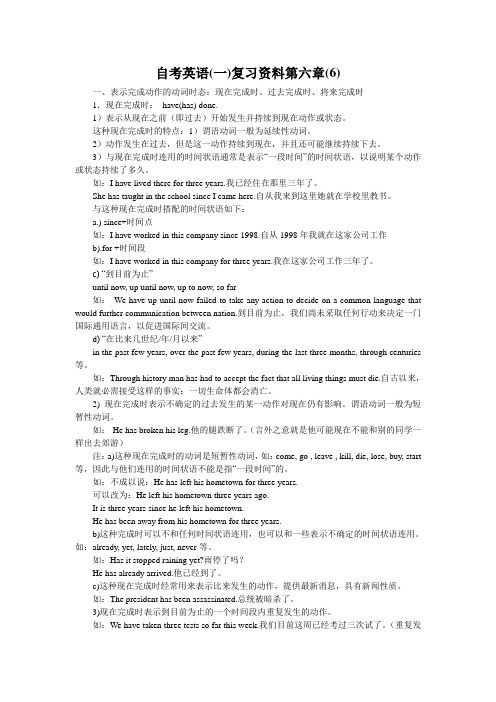
自考英语(一)复习资料第六章(6)一、表示完成动作的动词时态:现在完成时、过去完成时、将来完成时1.现在完成时:have(has) done.1)表示从现在之前(即过去)开始发生并持续到现在动作或状态。
这种现在完成时的特点:1)谓语动词一般为延续性动词。
2)动作发生在过去,但是这一动作持续到现在,并且还可能继续持续下去。
3)与现在完成时连用的时间状语通常是表示“一段时间”的时间状语,以说明某个动作或状态持续了多久。
如:I have lived there for three years.我已经住在那里三年了。
She has taught in the school since I came here.自从我来到这里她就在学校里教书。
与这种现在完成时搭配的时间状语如下:a.) since+时间点如:I have worked in this company since 1998.自从1998年我就在这家公司工作b).for +时间段如:I have worked in this company for three years.我在这家公司工作三年了。
c) “到目前为止”until now, up until now, up to now, so far如:We have up until now failed to take any action to decide on a common language that would further communication between nation.到目前为止,我们尚未采取任何行动来决定一门国际通用语言,以促进国际间交流。
d) “在比来几世纪/年/月以来”in the past few years, over the past few years, during the last three months, through centuries 等。

自考《英语一》语法:句法篇(2)2017自考《英语一》语法大全:句法篇四、同位语从句1. 定义:用作同位语的从句叫做同位语从句。
2. 用法:同位语从句的先行词多为fact, news, idea, thought, question, reply, report, remark等,关联词多用从属连词that。
如:They were all very much worried over the fact that you were sick.对你生病这件事,他们都很焦虑。
Where did you get the idea that I could not come?你在哪儿听说我不能来?Early in the day came the news that Germany had declared war on Russia.德国已对俄国宣战的消息一大早就传来了。
注:同位语从句偶尔由从属连词whether引导。
如:I have no idea w hether he’ll come or not. 我不知道他是否来。
连接代词who, which, what和连接副词where, when, why, how 亦可引导同位语从句。
The question who should do the work requires consideration.谁该干这项工作,这个问题需要考虑。
We haven’t yet settled the question where we are going to spend our summer vacation.到哪儿去度暑假,这个问题我们还没有决定。
It is a question how he did it.那是一个他如何做了此事的问题。
解释:1.that引导的同位语从句与定语从句之区别that引导的同位语从句句法功能上that只起连接从句的作用,无意义。
在从句中不充当句子成分。

自考英语(一)复习资料第五章本课主要单词1. fallacy n. 谬误;谬论;错误的推理或信念That the earth is flat used to be a popular fallacy.(地球是扁平的这一谬误曾一度很流行。
)Needless to say, this statement is based on fallacy.(不用说,这是一个基于谬误推理的陈述。
)2. quality n. 质量;品质,特性adj. 优质的,高级的He is a man of many good qualities.(他具有许多优秀品质。
)The quality of your products is superior to that of ours.(你们的产品质量比我们的好。
)You have no reason to deprive me of the right to a quality education.(你没有理由剥夺我受良好教育的权利。
)qualify v. 使合适,使胜任I am not very sure if he is qualified for the job.(我不很肯定他是否胜任这份工作。
)His skills qualify him for the job.(他的技艺使他有资格担任这一工作。
)qualified adj. 有资格的;称职的He is trying hard to make himself a qualified teacher.(他在努力使自己成为一个称职的教师。
)3. savage adj. 野蛮的,未开化的;凶猛的,残酷的n.野蛮人,粗野的人Most of the time elephants are tame but they can be very savage.(大多数时候大象很温顺,但他们也会大发野性。
)No one can put up with his savage manners.(谁也忍受不了他的粗暴态度。

(一).课程性质(二).大纲要求(二).大纲要求美国农民词汇1200高中3500四级4200自考3500六级6000(三).题型特色(三).题型特色(三).题型特色类型题型分值总计考点选择题10'8快速阅读10'4深度阅读非选择题10'9提取关键信息10'3连惯性15'6'判断15'4'转换30'20'120词合计66'(三).题型特色注意:请务必携带填涂机读卡的2B铅笔!!首先将姓名和准考证号填好,做题时将相应的答案涂在对应的答题卡上,切勿涂错!(四).备考重点(五).如何备考l(五).如何备考(六)学习方法讲解,,,,,,,,,,(六)学习方法讲解islet,,,,,,,,,,,,,,(六)学习方法讲解•实词虚词(六)学习方法讲解时间状态过 去现 在将 来过去将来一 般一般过去时did一般现在时do/does一般将来时will/shall do一般过去将来would/should do进 行过去进行时was/weredoing现在进行时am/ is/ are doing将来进行时will / shall be doing过去将来进行时would / should be doing完 成过去完成时had done现在完成时has / have done将来完成时will / shall havedone过去将来完成时would / should have done完 成进 行过去完成进行时had been doing现在完成进行时has / have beendoing将来完成进行时will / shall havebeen doing过去将来完成进行时would / should have beendoing(六)学习方法讲解••A式:(be were)B式:A式:had +B式:AB式:C式:D式:(六)学习方法讲解••句型例句(六)学习方法讲解And, but, yet, for, so,,,, or,,,,,,等(六)学习方法讲解(七)考试复习建议(七)考试复习建议(七)考试复习建议what,(七)考试复习建议,,,as,• n.•(措施)•…•"•• ()•••…得多•…•…相关••集中••确保考点一:比较级••考点一:比较级•••考点一:比较级例如考点一:比较级as,,just,,),等。
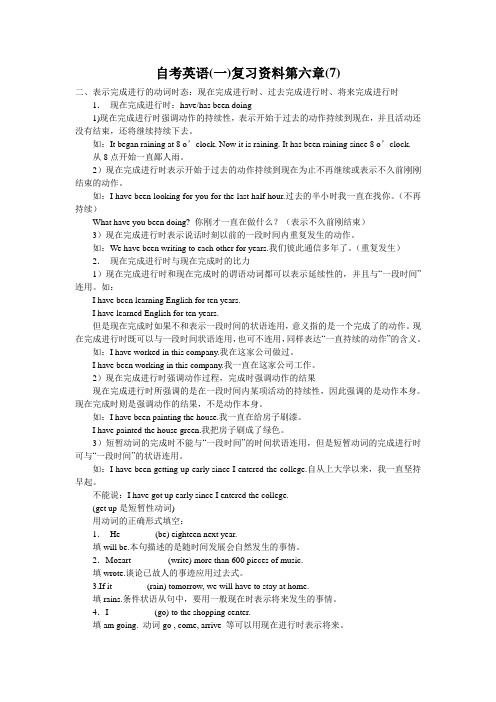
自考英语(一)复习资料第六章(7)二、表示完成进行的动词时态:现在完成进行时、过去完成进行时、将来完成进行时1.现在完成进行时:have/has been doing1)现在完成进行时强调动作的持续性,表示开始于过去的动作持续到现在,并且活动还没有结束,还将继续持续下去。
如:It began raining at 8 o’clock. Now it is raining. It has been raining since 8 o’clock.从8点开始一直鄙人雨。
2)现在完成进行时表示开始于过去的动作持续到现在为止不再继续或表示不久前刚刚结束的动作。
如:I have been looking for you for the last half hour.过去的半小时我一直在找你。
(不再持续)What have you been doing? 你刚才一直在做什么?(表示不久前刚结束)3)现在完成进行时表示说话时刻以前的一段时间内重复发生的动作。
如:We have been writing to each other for years.我们彼此通信多年了。
(重复发生)2.现在完成进行时与现在完成时的比力1)现在完成进行时和现在完成时的谓语动词都可以表示延续性的,并且与“一段时间”连用。
如:I have been learning English for ten years.I have learned English for ten years.但是现在完成时如果不和表示一段时间的状语连用,意义指的是一个完成了的动作。
现在完成进行时既可以与一段时间状语连用,也可不连用,同样表达“一直持续的动作”的含义。
如:I have worked in this company.我在这家公司做过。
I have been working in this company.我一直在这家公司工作。
2)现在完成进行时强调动作过程,完成时强调动作的结果现在完成进行时所强调的是在一段时间内某项活动的持续性,因此强调的是动作本身。
洛基英语,中国在线英语教育领导品牌V erb Pattern 1主语+系动词+表语(代词/名词/名词短语)Time is money.The dictionary is mine.Wasting time is a bad habit.You must become the master of time not its servant.Sunday seems to be the best study day for many students.注意:用于这一句型的系动词主要有appear, be , become ,feel, look, prove , remain, seem 和sound 等。
系动词appear ,seem 和prove 后面可加to be.V erb Pattern 2主语+系动词+表语(形容词/形容词短语)Time is dangerous.One thing is certain.A good plan must be a little flexible.Andersen remained single all his life.The plays and poetry that Andersen wrote were not very good.注意:用于这一句型的系动词主要有appear, be , become ,feel,get,go,grow,keep, look, prove , remain, seem,smell,sound,stay,taste 和turn等。
系动词appear ,seem 和prove 后面可加to be.V erb Pattern 3主语+系动词+表语(副词/介词短语)At last we were/got home.The birthday party will be at nine.The children are in the garden.Hans felt most at ease with children.One big fact that he could not see was right under his nose. 注意:用于这一句型的系动词主要有be , feel,get和keep。
V erb Pattern 4主语+不及物动词The moon rose.His mother has left.The telephone is ringing.The glass dropped and broke.The old man can''t read and write.注意:用于这一句型的动词不能用于被动结构。
V erb Pattern 5主语+不及物动词+状语(副词/副词短语)He speaks quickly.She sings beautifully.The boy played very well.My husband smokes heavily.This winter snow came early.注意:用于这一句型的动词一般不用于被动结构。
V erb Pattern 6主语+短语动词*主语+不及物短语动词(动词+副词性虚词)For 37 years, a new book of Andersen''s fairy tales came out each Christmas. *主语+及物短语动词We should take care of public property.He walk too fast. I couldn''t catch up with him.The young man looked up the word in the dictionary.Andersen listened to the tales which the women told at their weaving.注意:部分及物短语动词可用于被动结构,但主动结构更为自然。
V erb Pattern 7主语+及物动词+宾语(名词/名词短语/代词)I believe him.He is watching television.Andersen had a beautiful high,clear voice.Andersen forgave the man and comforted him.Each of the cards represents an actual use of the word by a writer of some importance.注意:除动词have,lack,fit,suit,resemble外,用于这一句型的其它动词均可用于被动结构,但主动结构更为自然。
如:The man was forgiven and comforted (by Andersen).V erb Pattern 8主语+及物动词+宾语(that 从句)The man also noticed that he was getting fat.The old man said that he was sorry for what he had done.An emergency-room nurse learned that the old man''s son was a Marine stationed in North Carolina.Occasionally,the nurse suggested that the Marine rest for a while.You may suddenly find that there is no way to stretch the little time you have left to cover all your duties.注意:1.连词that可以省略。
2.用于这一句型的动词能用于被动结构,一般用先行词it作为形式主语,真正的主语置于句尾连词that不能省略。
如:It is widely believed that every word has a correct meaning.V erb Pattern 9主语+及物动词+宾语(wh-/how/if/whether从句)主语+及物动词+宾语(wh-/how/whether不定式短语)I don''t know whether it is true.You can emagine what happened!The small boy doesn''t even know how to read.The old man couldn''t decide which of his children to leave his money to.The article explained how dictionaries are made and how the editors arrive at definitions.注意:1.用于这一句型的部分动词可用于被动结构,一般用先行词it作为形式主语,真正的主语置于句尾。
如:It was explained how dictionaries are made and how the editors arrive at definitions.It couldn''t be decided (by the old man) which of his children to leave his money to.2.副词why不能引导不定式短语。
V erb Pattern 10主语+及物动词+宾语(不定式短语)I can''t afford to find that out.The others pretended to sneeze.I began to think about what he''s said to me.Relatives who had not spoken for years promised to stay in touch.Andersen wanted to write plays in poetry and to act at the Royal Theater.注意:1.不定式分句隐含的主语总跟主句的主语一致。
2.用于这一句型的动词不能用于被动结构。
V erb Pattern 11主语+及物动词+宾语(动名词短语)I forgot closing the window.We began shouting at each other.In the short-term, you can start practising being happy.Henry Ground loved sitting in the sun and counting the blades of grass.Henry Ground couldn''t resist playing one last little joke on his friends.注意:1.用于这一句型的动词常用的有avoid, begin, consider, continue, dislike, enjoy, finish, forget, hate, like, love, remember, require, resist, start, stop,和try。
2.用于这一句型的动词一般不用于被动结构V erb Pattern 12主语+及物动词+宾语+宾语补语(不定式短语)I wish you to tell me the truth.Henry asked his brother Colin to read out his will.The job requires you to speak good English.The Prince told Andersen to learn a useful trade.They advised Hans Christian not to write any more poetry and plays, and to try to get a government job.注意:1.用于这一句型的动词有allow, advise, expect, forbid, invite, hate, like, order, teach, tell, warn。